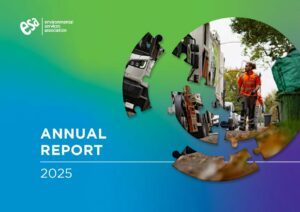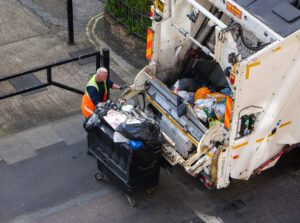By Emilia Peters, ESA Environmental, Social and Governance (ESG) Policy Officer
With the waste and recycling sector a ‘high risk’ industry for modern slavery in the UK, businesses must remain vigilant and aware of modern slavery risks across their workforce and supply chains.
Modern slavery is the umbrella term which encompasses the acts of slavery, servitude, forced or compulsory labour as well as human trafficking. It can take many forms including trafficking of people, forced labour and bonded labour. Reports of modern slavery in the UK continue to rise, with 17,004 potential victims of modern slavery referred to the Home Office in 2023.
There are 147,000 people employed in the collection, treatment and recovery/recycling of waste in the UK, of which nearly 50% are recorded as being employed in the ‘waste collection’ category.
Despite being in a highly regulated environment, the industry does embody some characteristics which can be exploited by criminal activity. Generally speaking, the highest risk in the waste supply chain in relation to modern slavery and labour exploitation is where there is sorting or picking required and where the use of temporary labour or agency workers is relatively high.
The recent Anti-Slavery Week earlier this month provided a focal point on this issue and an opportunity for businesses in the waste and recycling sector to review their policies and procedures to prevent, detect and report modern slavery and, where applicable, ensure they are compliant to the Modern Slavery act.
Under the Modern Slavery act, businesses must prepare a slavery and human trafficking statement for each financial year if the business supplies goods and services and has a total turnover of over £36 million. Businesses are advised to carry this out as best practice even if they do not meet the turnover criteria. The statement should be published in a prominent place on their web homepage and reviewed annually.
Some actions businesses should be taking to tackle modern slavery include:
- Develop a modern slavery and labour policy
- Provide awareness training to all staff and update this regularly
- Have a clear internal process in place for escalating concerns, as well as contact channels with charities and authorities that can help and support
- Undertake a supply chain risk assessment and map to understand the risk and focus efforts
- Communicate your policy with suppliers, seeking formal acceptance and commitment to its implementation
The recycling and waste treatment sector has worked collaboratively to tackle modern slavery and raise awareness by publishing the Modern Slavery Toolkit for the sector in 2022, together with the Waste & Recycling Sector Modern Slavery Protocol for organisations to demonstrate their commitment to tackle the issue. As the sector evolves to meet the demands of the circular economy, more workers may be recruited so it is essential that businesses remain aware of the risks of modern slavery.
For more information and practical guidance for businesses including procurement, responsibilities of individuals, and key considerations in labour sourcing, visit the Indirect Procurement Human Rights Forum Modern Slavery Toolkit for the Waste & Recycling Sector which is available on our website. This guide is intended for both large and small businesses who are introducing new procedures or reviewing current ones.




